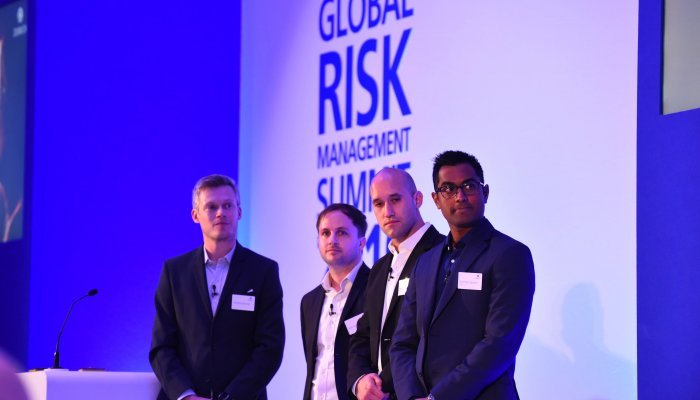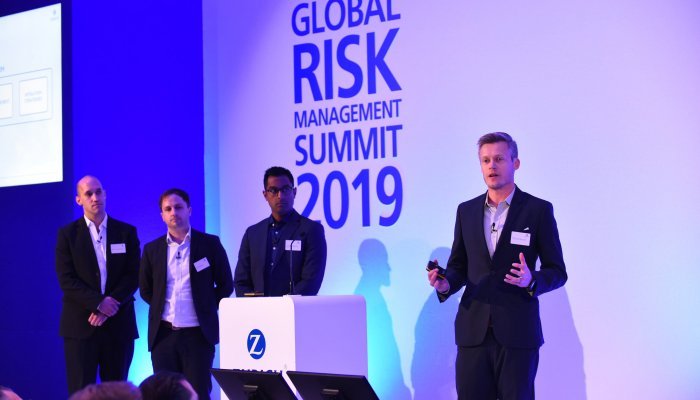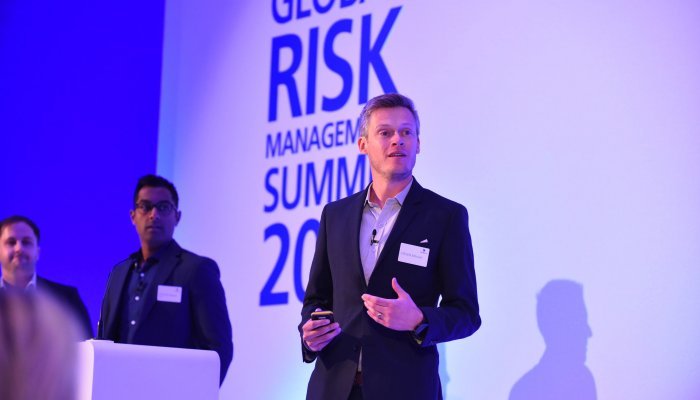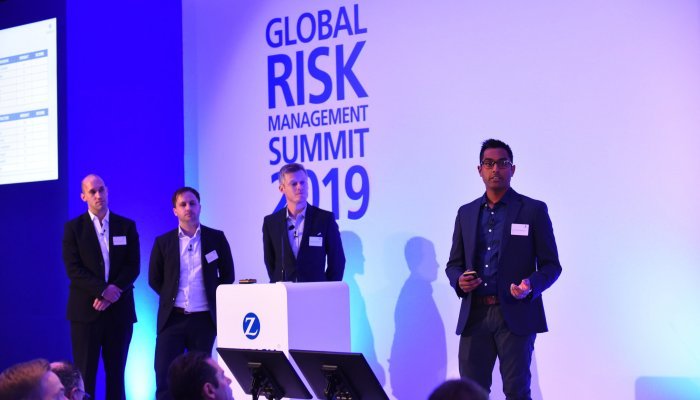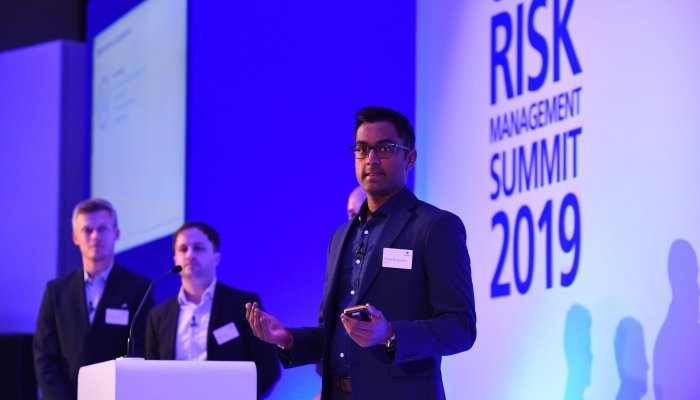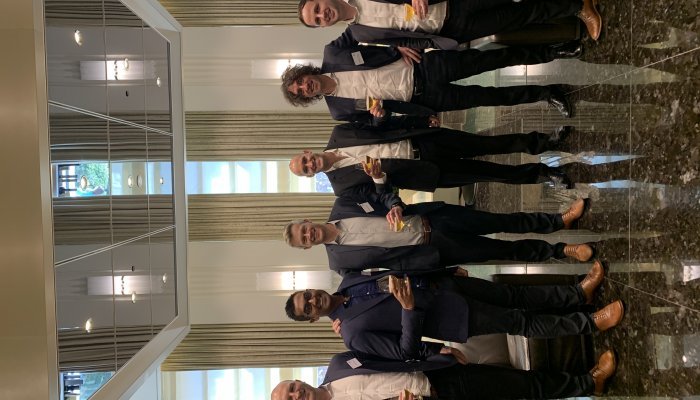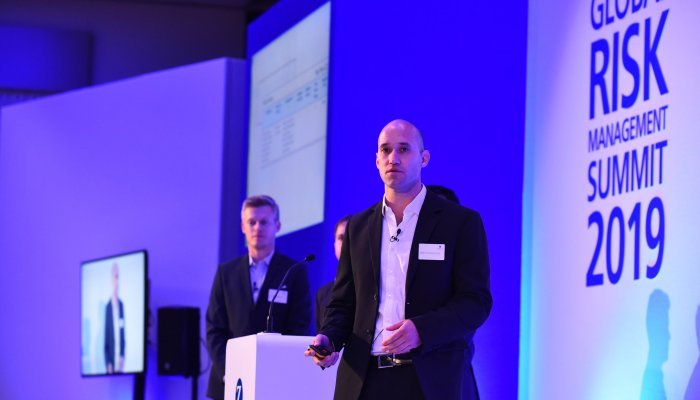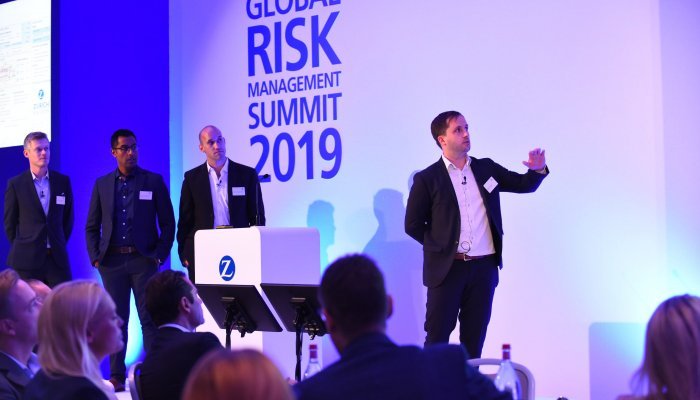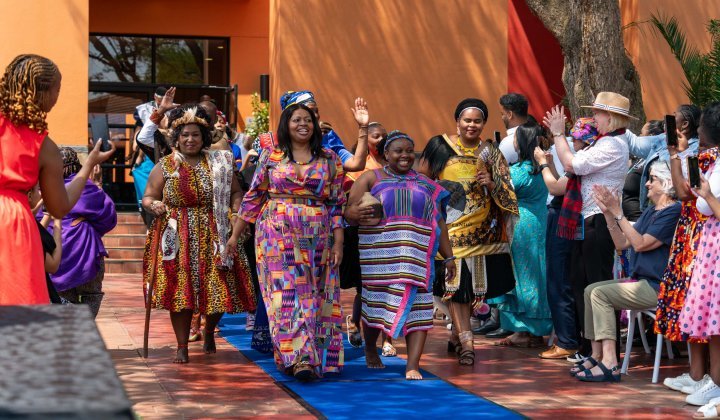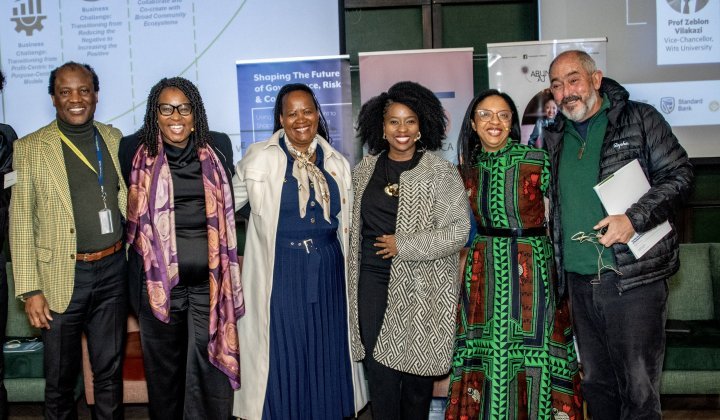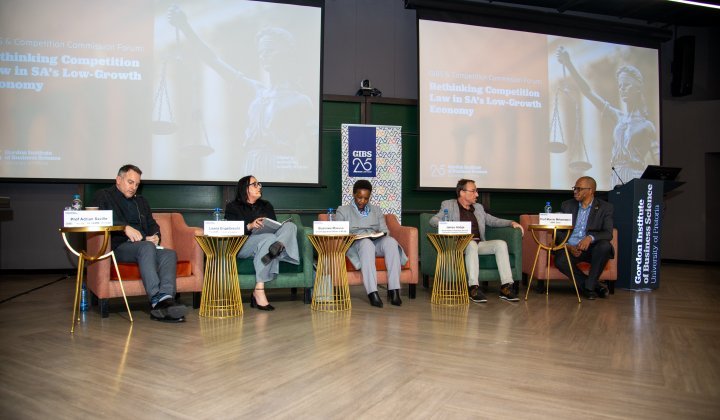On 9 August 2019 ‘The Zamaleks’ dialled into Cologne, Frankfurt and Zurich via a GIBS video uplink to deliver a 20-minute presentation to global high-flyers and executives from some of the world’s leading companies. By 2 September they were celebrating GIBS’s second Zurich Challenge triumph in three years after beating Oxford and Manchester universities to the win.
Just a month later and the team, comprising Kovilen Naicker, Brett Gottschalk, Steven Mitchell and Benjamin Walker, were presenting their emerging risk platform concept for the aviation industry to 200 senior executives from blue-chip companies around the world at the Zurich Global Risk Management Summit in Milan, an annual conference tackling the challenges of managing global risk.
At the same conference, recalled Walker, lecturer Carlo Alberto Carnevale Maffé from the Bocconi School of Management spoke about collective intelligence, the utilisation of data and the accessibility thereof. “So we hit home on some very pertinent topics which some senior execs are struggling and grappling with today,” said Walker during a group conference call with Acumen.
From the onset of the challenge the team found a way to hit the right note by appealing to the needs and focus of global organisations when it comes to unpredictable risks and challenges. Partnered with Lufthansa in the second-phase project, The Zamaleks delivered a product so relevant to the global airline that at the time of writing the four were packing for Germany to discuss a potential future collaboration with Lufthansa.
The winning concept
Due to Lufthansa’s interest in building the product, some of the finer details of their winning product were being kept under wraps, but Walker explained that the crux of the solution lay in creating a framework for understanding how interaction happens within an organisation, particularly large multinationals where leaders can be disconnected from issues critical to the operation of the business.
...we hit home on some very pertinent topics...
“In identifying emerging risks it’s all about being able to get access to information quickly in order to act swiftly,” explained Walker. “Once we understood that, we were able to conceptualise something that allowed for a more or less instantaneous process. Our platform and risk management dashboard were about coming up with ways to get that information to the risk managers so they could ask upon it.”
Gottschalk added: “In a world where data is a hot topic – big data and the utilisation of big data – and in a world of utilising collective intelligence, I think our platform hit home quite nicely.”
It was not only Lufthansa’s interest that was piqued. Following the Madrid conference, Naicker said that many executives asked that the team stay in contact with them so that when they actually build the product for Lufthansa, they can also assist in implementing it in their organisations. Zurich, which is developing its own risk management platform, had also expressed interested in integrating some of the ideas raised. In spite of that interest, Naicker stressed that Zurich was highly supportive of enabling the team to “go on and actually build this thing”.
World-class innovation
For the team, this freedom was invaluable, allowing them to fully capitalise on the whirlwind exposure as well as the clear value being placed on South African skills in the international market.
“As South Africans, sometimes we feel a bit stranded at the bottom end of Africa, so to be recognised on a global scale like this and to have people really enjoying the kind of thinking we are able to bring was really encouraging,” said Mitchell, who spent October with Naicker in Madrid completing their global module while Gottschalk and Walker opted for New York.
This time in Spain certainly highlighted the value of the GIBS MBA approach as well as the managerial nuance which comes from operating in a highly complex society like South Africa.
“At GIBS, to get into the MBA you generally need a minimum of five years’ management experience,” said Naicker. “Between the four of us we have a very diverse skills set and quite substantial experience in our respective fields; whereas MBAs around the world go straight from their honours year into their masters. Being in Madrid brought that home to Steve and I, when our experience proved really beneficial to our thinking process.”
For The Zamaleks, the MBA was a life-changing opportunity, which meant embracing the full experience, including the Zurich Challenge. “In the local context, we’ve all achieved relative success in our young careers, so we wanted to test ourselves on a global level,” recalled Naicker. A test they passed with flying colours, in part because of the unique and complex South African environment.
“Coming from South Africa you are almost forced into being more of a problem solver, just because we have a very interesting context,” said Mitchell. “This pushes you into a way of thinking that is more innovative. That was part of our success. We were working in an industry and area that none of us were particularly familiar with and that forced us to bring a different angle to the solution we provided.”
Where to from here?
Putting this unique South African perspective to the test has resulted in the opening of international doors and networks, something the four are keen to capitalise on. But will this see the members of the team heading abroad?
“We’ve all been debating this,” admitted Mitchell. “All four of us certainly call South Africa home and most of us feel a responsibility to make a difference in our home country; we are all quite passionate about South Africa. I think that came through in the Rugby World Cup. But we all believe we’re privileged to have done an MBA and we feel it is part of our duty as South Africans to help this country.”
Irrespective of whether their addresses change, it seems likely that some form of international experience and exposure is on the cards. This continues the evolution which began in 2018 when they all resigned from their respective jobs to undertake their full-time MBA studies. Since then, each of the four have embarked on small start-up projects and formed companies, and seen their interests diverging away from their previous career paths. “Brett is keen to do management consulting, Ben is going into more social entrepreneurship, I’ve started something in healthcare, and Steve has something in education,” said Naicker. “And who knows what else!”
A call to action
What is crystal clear is their wholehearted recommendation that every GIBS MBA student carves out the time to tackle the Zurich Challenge. “I would definitely recommend it to the incoming MBAs; definitely do this,” said Gottschalk. “GIBS prepared us to be internationally competitive and this has really shown us that we can compete with everyone else in the world, and we can come out on top. Maybe it just takes a bit of bravery, or stupidity, but it’s yours for the taking.”
...the clear value being placed on South African skills in the international market....
Mitchell added, “This was a great, real-life opportunity to test the skills we acquired doing the MBA. An MBA can get you bogged down in the theory and assignments, but the Zurich Challenge is like a real-life consulting project, and that hands-on experience is invaluable. It really bolsters everything we did on the MBA.”
This was a great, real-life opportunity to test the skills we got doing the MBA.
The role of the GIBS team on this journey was also invaluable. “We had one or two of the GIBS staff members telling us that we spent more time on campus than them, so it did take a lot of dedication. But it was worth it in the end,” recalled Mitchell, while Naicker and Gottschalk stressed that the assistance and support from GIBS was essential, from setting up video conference links to dealing with the administrative details to bouncing around ideas.
“The GIBS staff really helped us through this and I don’t think we would have been as successful without them,” said Gottschalk. This even extended to arranging a meeting early on in the process with two of the 2016 winners, Ewald Beukes and Jamal Sahib.
Sahib recalled how Team Brand SA freely shared their model and approach. “I remember us telling them how they needed to start with the end in mind,” said Sahib. “Our salient advice was to begin by knowing what Zurich and the partner companies were looking for and then to go full-out on the presentation – no being stingy!”
The 2019 Zurich Challenge champions clearly took all this on board, applied a forward-thinking approach, wrapped it up in teamwork, gave it guts and determination, excellent time management, and a WhatsApp group that kept buzzing. Ultimately, it proved to be the winning formula.
What is the Zurich Challenge?
The Zurich Enterprise Challenge is a three-phase team competition which offers Masters, MBA and PhD students the chance to work directly with multinational companies and Swiss-based global insurer Zurich Insurance in an effort to find solutions to real-world corporate challenges.
Teams go head-to-head for a 5,000 Swiss franc (about R76,000) cash prize and the chance to attend and present at the prestigious Zurich Global Risk Management Summit.
In phase one of the challenge, teams solve a generic case study using Zurich’s country risk assessment tool. Once the field has been whittled down to 20, these teams collaborate with a Zurich multinational corporate customer to tackle an existing issue.
Meet ‘The Zamaleks’
Kovilen Naicker (29)
B.Eng Civil Engineering (Hons); Post Graduate Diploma in Project Management; Post Graduate Diploma in General Management; Master’s in Business Administration (GIBS)
Naicker enjoys strategy development in complex environments. He has experience in the construction, engineering and project management space, having worked on and lead construction on large-scale infrastructure projects around South Africa, from water treatment and rail, to port terminals, petrochemicals, sanitation and road construction. Naicker is now entering the realm of entrepreneurship in the healthcare, infrastructure and social spaces.
Brett Gottschalk (28)
Diploma in Management Accounting; B.Com Financial Management Science (Management Accounting); Master’s in Business Administration (GIBS)
Gottschalk has worked in finance in the original equipment manufacturing and telecom industries. He has an active interest in consulting, entrepreneurship and strategy.
Steven Mitchell (31)
BA Film, Media and Screen Production; Post-Graduate (Advertising, Marketing and Communications Management); Post-Graduate (Management Development); Certificate (Digital Marketing); Post Graduate Diploma in General Management; Master’s in Business Administration (GIBS)
Mitchell has extensive experience working for some of South Africa’s most awarded advertising agencies having successfully led multi-faceted, cross-continental campaigns and headed up business units for several blue-chip clients. Passionate about strategy and digital, he is looking forward to further flexing his entrepreneurial muscles.
Benjamin Walker (30)
B.Sc Civil Engineering; MSc Civil Engineering (Structural Engineering); Post Graduate Diploma in General Management; Master’s in Business Administration (GIBS)
Walker has varying experience ranging from managing multi-disciplinary projects in the construction industries, to running with entrepreneurial businesses. He boasts local and international experience and has a passion for strategy, the inner workings of business, and entrepreneurship.
… and ‘The Zamaleks’?
As for the name, well, that’s something of an in-joke for South Africans who enjoy an ice-cold Carling Black Label. Mitchell explains: “We liked to see it as a symbol of coming together and solving the problems of the world in mutual conversation. But, ja, it’s mostly that we enjoy a good beer!”


